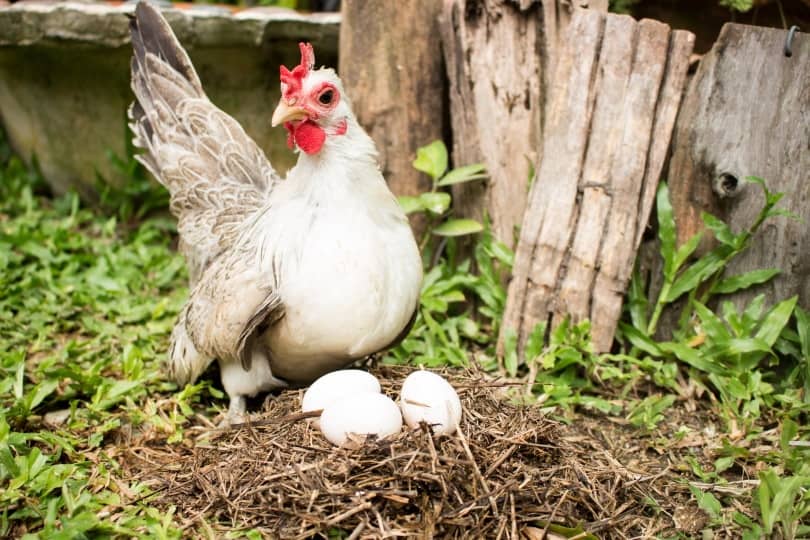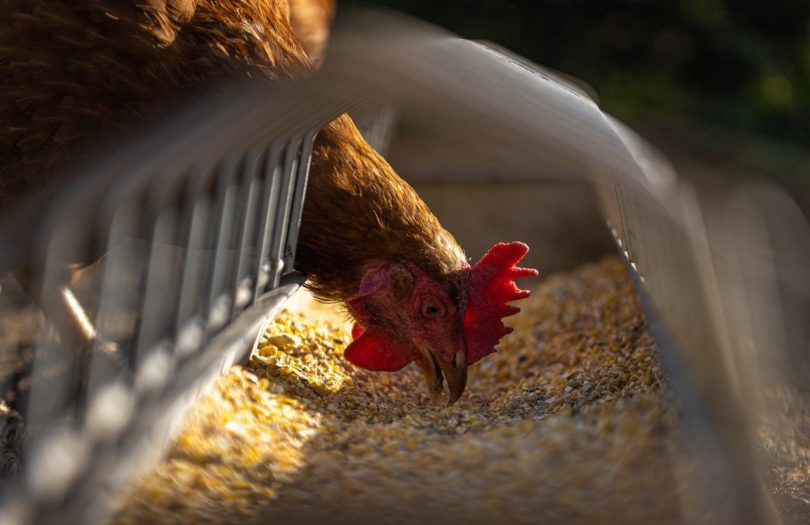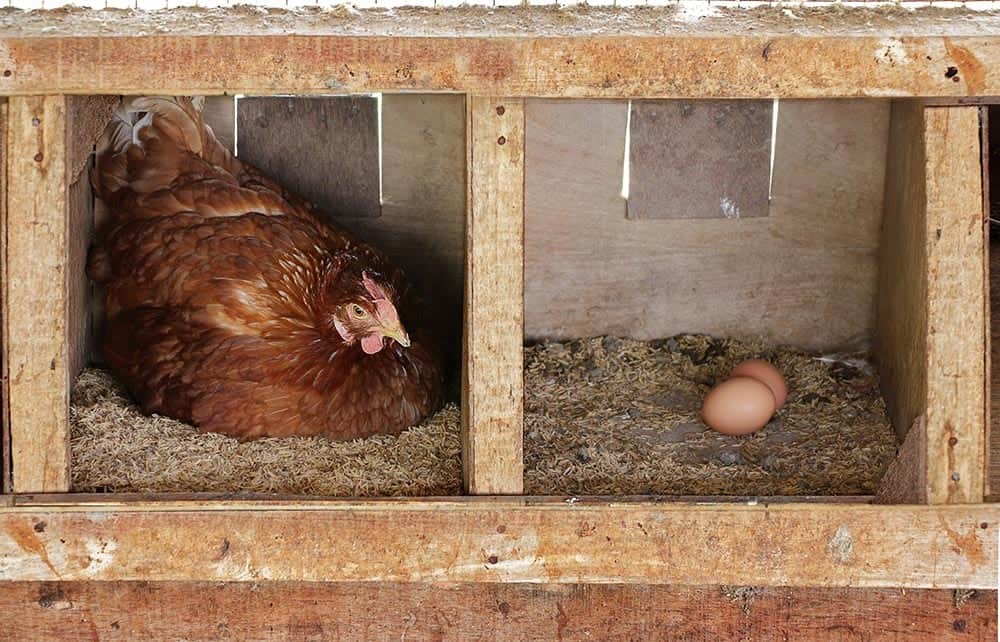Approved by Dr. Luqman Javed
If you are interested in becoming a chicken-keeper or have just begun your journey; you may be wondering if chickens can lay eggs daily. While roosters cannot lay eggs, you do not need a rooster for your hens to lay eggs either. Healthy hens can lay eggs without the presence of a rooster and do typically lay an egg every day if sunlight exposure is sufficient.

Egg Laying
Hens typically begin producing eggs between 18 and 22 weeks of age. This can be dependent on the breed of chicken, but generally, all breeds will have begun laying by 7 months of age. A laying hen will naturally ovulate once every 24 to 27 hours. During this process, her ovaries release a fully formed egg yolk in the oviduct. It takes approximately 26 hours for the egg to travel through the oviduct and fully form, complete with the shell.
If the hen has had access to a rooster and they have mated, it is possible the egg could be fertilized but she will lay the egg regardless of whether it has been fertilized.
It is not uncommon for eggs to be shaped abnormally or have unusually soft shells when hens have underlying health issues that interfere with proper egg production. Certain breeds may lay better than others, so it’s important to be well educated on the breed of chickens you are caring for.
Considering the average length of ovulation taking place every 24 to 27 hours and an egg taking around 26 hours to fully develop, you can expect healthy hens to lay an egg daily. It is not uncommon for a hen to skip a day either. Overall, hen’s egg production is dependent on breed, diet, and environmental factors.

Do All Hens Lay Eggs?
All healthy hens should regularly produce and lay eggs. While rare, if a perfectly healthy hen has never produced any eggs, this could be due to an underlying genetic condition that prevents her from ovulating successfully.
If you notice a hen that normally produces well but has stopped laying, there are a variety of reasons that could cause this.
Reasons Why a Hen Stops Laying Eggs
Age
A hen’s egg production can decrease and stop as they age. Most hens will regularly produce eggs for an average of 6 to 8 years before egg production begins to slow down and eventually stop. With an average lifespan of 5 to 10 years, a hen can live for a while after retirement from egg-laying.
Diet
A hen needs to be consuming a well-rounded diet and remain hydrated to successfully produce eggs. Laying hens require higher amounts of protein, calcium, essential vitamins, and water. Ensuring your hens are fed a proper diet and have access to clean, freshwater is key to having successful layers. If you notice a lack of production, you will want to examine their diet and rule it out as a possible cause.

Light Exposure
Ovulation in hens is dependent on exposure to natural light and the length of daylight. Hens need an average of 14 to 16 hours of light exposure for proper egg production. A hen will reach their maximum egg production during the summer due to the longest hours of daylight. Chicken keepers can provide artificial lighting in the spring, fall, and winter when the natural daylight hours are limited.
Stress
Stress can have a significant effect on a hen’s egg production. Many factors can result in stress, such as predators lurking nearby, new additions to the flock, or changes to their environment or routine. Figuring out the root of the hen’s stressors and handling the situation accordingly is key to solving this issue.
Illness
Chickens can fall ill due to a variety of health conditions. If a hen is experiencing illness, it can result in a lack of egg production. If you notice any unusual symptoms, it’s best to contact your veterinarian for proper diagnosis and treatment. Isolating any chickens that are exhibiting any signs of illness is crucial to prevent possible spread.
Parasites
Chickens can fall victim to internal or external parasites which can cause a decline in their overall health and egg production. It’s important to determine the source of the parasitic infection so that proper treatment can be administered.
Molt
Chickens will molt before egg-laying begins but will begin molting annually beginning around 18 months of age. This process of losing old feathers and experiencing regrowth can cause a decrease in egg production.
Fertilized Eggs vs Unfertilized Eggs
If a hen has regular access to a rooster, there is a possibility her eggs have been fertilized prior to laying. Chicks can only develop from a hen’s fertilized eggs, and they must be incubated successfully for 21 days.
If a chicken keeper’s goal is to produce chicks, they may allow their hens to sit on the eggs for the incubation period or may remove them and place them in an incubator. Fertilized eggs require adequate warmth for proper and successful development.
Both fertilized and unfertilized eggs can be consumed. If a fertilized egg is removed shortly after being laid and is not incubated, the embryo will not be present within the egg.
Eggs used for consumption are generally unfertilized. Eggs that are being sold as fertile eggs (for those who wish to hatch their own chicks) are quickly collected once laid. An egg will no longer be viable if the embryo starts developing under the correct temperature and humidity and the incubation process is interrupted.
A fertilized egg that hasn’t started the incubation process can be kept for up to 24 days in ideal conditions and still hatch once incubated. Fertilized eggs should not be washed, as this removes the invisible cuticle on the shell and exposes the developing chick to bacterial infection. The cuticle can also be lost if an egg is refrigerated and then exposed to normal temperatures due to condensation. For this reason, fertilized eggs should not be placed in a refrigerator.
There is no nutritional difference between a fertilized and unfertilized egg and the flavor and consistency are typically indistinguishable. However, the nutritional composition of an egg largely depends on a chicken’s diet.

Conclusion
Hens do not have to mate or even be kept in the presence of a rooster to lay eggs. Healthy hens will naturally produce and lay eggs regardless of fertilization status.
The age a hen begins producing eggs, and the rate of egg production can vary depending on breed, but hens typically start producing eggs by 7 months of age. Hens will ovulate any lay every 24 to 27 hours on average and will typically lay eggs daily but may occasionally skip a day.
Featured Image Credit: thanasus, Shutterstock
